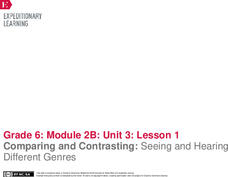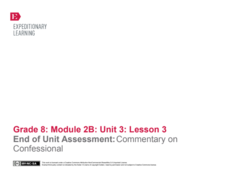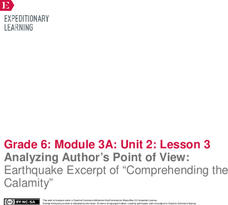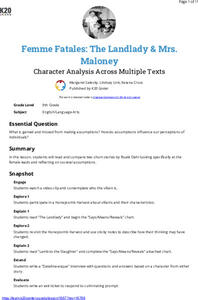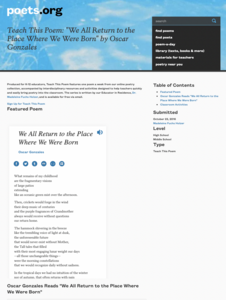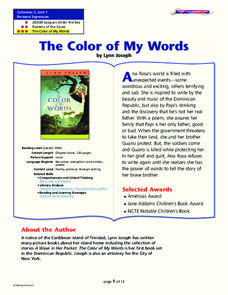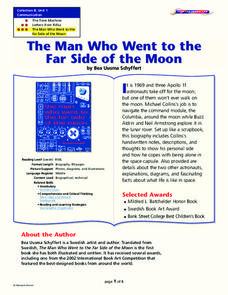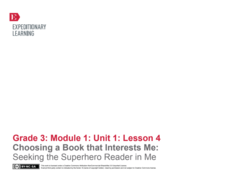K20 LEARN
More than Meets the Eye: Direct and Indirect Characterization
Willy Wonka takes center stage in a instructional activity about direct and indirect characterization. Scholars read a passage from the story about Wonka's Grand Entrance and watch a film clip of the same, noting examples of direct and...
Curated OER
MTV's Poetry
Students use several strategies in poetry to convey tone and speaker. In this language arts lesson, students read and build vocabulary as they gain a larger understanding of how to write poetry. Students then work in groups in order...
EngageNY
Preparing to Write Historical Fiction: Determining Characteristics of the Genre
A language arts instructional activity helps young writers identify elements that make up historical fiction. First, it guides them through elements of fictional pieces with vocabulary cards. Then, pupils work collaboratively to...
EngageNY
Comparing and Contrasting: Seeing and Hearing Different Genres
Let's compare and contrast! Scholars use a Venn diagram to compare and contrast the experience of reading a poem and listening to its audio version. Next, they complete graphic organizers, comparing two different genres: a poem and a...
EngageNY
Seeing, Hearing, and Comparing Genres: A Poem and a Letter
One can never be too prepared. Pupils prepare for their upcoming mid-unit assessment by writing their group norms for small group discussions. Additionally, scholars read and listen to a poem, comparing the two experiences using a Venn...
EngageNY
Organizing an Opinion, Reasons, and Evidence: Expert Group Text 3
Let's race to the finish line. Scholars read an informational text about a chosen athlete. While reading, they add evidence and reasons to a graphic organizer to support their opinions about how their athlete broke barriers.
EngageNY
Conducting Research: Analyzing Expert Texts about the Mary River Project
Pupils read informational texts about the Mary River Project, searching for the gist. As they read the expert texts, they complete a graphic organizer to identify and analyze point of view.
K20 LEARN
Mob Mentality and "The Outsiders": Integrating Fiction and Nonfiction
S. E. Hinton's The Outsiders allows middle schoolers to reflect on mob mentality. After reading an article and watching a video about herd mentality, class members find examples in the novel of when characters go along with the...
Curated OER
Act It Out!
An effective way to demonstrate understanding is by synthesizing one's own work. Use a creative lesson designed for a unit on Lorraine Hansberry's A Raisin in the Sun for small groups to show what they know about the play,...
National Gallery of Canada
Reading Sculptures
Consider the elements and principles of design closely while examining works of art. Learners select an image from the provided pieces to write about in relation to the elements and principles of design. They then sketch and sculpt their...
K20 LEARN
Manifest Destiny: U.S. Territorial Expansion
A close examination of John Gast's painting "American Progress" launches a study of the concept of Manifest Destiny used to justify United States' policy of westward expansion. Young historians read statements from persons with different...
Learning for Justice
The Color of Law: Creating Racially Segregated Communities
It is pointed, powerful, and painful! The first of three lessons about laws and practices that support inequality looks at how government policies created and reinforced segregated communities. Young social scientists read excerpts from...
EngageNY
End of Unit Assessment: Commentary on Confessional
What does commentary have to do with narrative? Before scholars explain the narrative choices in their Character Confessionals, they review provided commentary to explain the score they received on previous assessments. They review...
EngageNY
Analyzing Author’s Point of View: Earthquake Excerpt of “Comprehending the Calamity”
How do authors convey their points of view? Using the resource, scholars read an excerpt from a primary source document about the 1906 San Francisco earthquake. Then, they complete graphic organizers to analyze the author's point of view.
Health Smart Virginia
Shake It Off
It requires more than a twitch to shake off stress. But with the help of the stress management strategies taught in a very dynamic lesson, freshmen can learn to do so. Class members watch videos, examine an infographic, read an article,...
K20 LEARN
Femme Fatales - The Landlady and Mrs. Maloney: Character Analysis Across Multiple Texts
Two stories by Roald Dahl, "Lamb to the Slaughter" and "The Landlady" provide readers an opportunity to compare stories by the same author. After a close reading of the stories, teams select a character from one of the tales, craft...
Learning for Justice
The Color of Law: Winners and Losers in the Job Market
The second lesson plan in "The Color of Law" shows how government policies supported economic inequality. Scholars read additional excerpts and respond to text-dependent questions from "The Color of Law" text, examine primary source...
Academy of American Poets
Teach This Poem: "We All Return to the Place Where We Were Born" by Oscar Gonzales
What do you remember about your childhood home? Scholars listen to Oscar Gonzales reading his poem "We All Return to the Place Where We Were Born" in Spanish and English, then discuss what they learned about Gonzales.
Curated OER
Two Greedy Bears
Improving listening comprehension skills is the goal of this language arts activity. Young readers listen to the story Two Greedy Bears, stopping to have discussions with a partner. They predict outcomes and make inferences based on...
Curated OER
May I Take Your Order, Please?
Pupils read a story, boil down that story to 5 to 7 key events, create a sequencing quiz to go with the story and have their classmates take the quiz. They will the strategy of sequencing by reading various stories (that they are not...
Curated OER
The Color of My Words
Explore the story The Color of My Words by Lynn Joseph using this resource. Learners answer comprehension questions, fill in graphic organizers, and write a poem.
Curated OER
The Man Who Went to the Far Side of the Moon
Practice comprehension skills using the story, The Man Who Went to the Far Side of the Moon by Bea Uusma Schyffert. Learners answer questions, fill out graphic organizers, and engage in extension activities involving writing and...
EngageNY
Choosing a Book That Interests Me: Seeking the Superhero Reader in Me
Selecting a "power book" and engaging in a structured class discussion are the learning targets for this fourth instructional activity in a larger unit. It is designed as a beginning of the year unit for establishing norms and routines...
Curated OER
Reading for Tone and Inference
Using a reading passage, this lesson plan leads learners through an exploration of a text. This activity focuses on identifying what the reading passage is about, its tone, and key elements.



